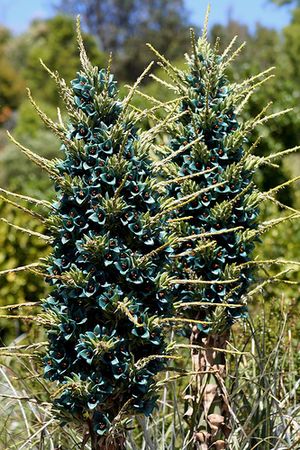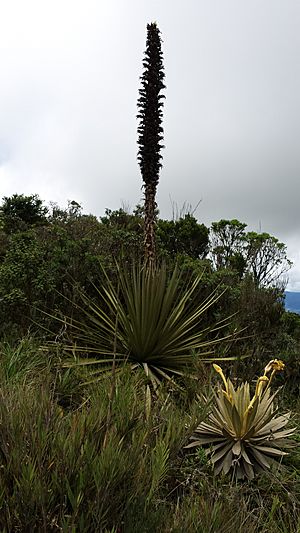Puya (plant) facts for kids
Quick facts for kids Puya (plant) |
|
|---|---|
 |
|
| Puya berteroniana | |
| Scientific classification |
|
| Kingdom: | Plantae |
| Clade: | Tracheophytes |
| Clade: | Angiosperms |
| Clade: | Monocots |
| Clade: | Commelinids |
| Order: | Poales |
| Family: | Bromeliaceae |
| Subfamily: | Puyoideae Givnish |
| Genus: | Puya Molina |
| Type species | |
| Puya chilensis |
|
| Species | |
|
See text |
|
Puya is a type of plant that belongs to the plant family called Bromeliaceae. It's the only group in its special subfamily, Puyoideae. There are 226 different kinds, or species, of Puya plants.
These plants grow on the ground, mostly in the Andes Mountains of South America and also in southern Central America. Many Puya plants are "monocarpic." This means the main plant dies after it flowers once and makes seeds.
One famous species is Puya raimondii. It is the biggest bromeliad plant known! It can grow up to 3 meters (about 10 feet) tall before it even flowers. Its flower spike can reach an amazing 9 to 10 meters (about 30 to 33 feet) tall. Other Puya species are also large. Their flower spikes usually grow 1 to 4 meters (3 to 13 feet) tall.
The name Puya comes from the Mapuche Indian language. It means "point," probably because of the plant's sharp leaves or tall flower spikes.
Scientists often divide the Puya genus into two smaller groups. These are called Puya and Puyopsis. The Puya group has eight species. The Puyopsis group includes all the other species. You can tell them apart by looking at their flowers. Plants in the Puya group have a flower stalk that doesn't produce seeds at the very top. Plants in the Puyopsis group have flower stalks that do produce seeds at the top.
Amazing Puya Species
There are many different species of Puya plants. Each one is unique and adapted to its home in the Andes. Here are just a few examples of the many species:
- Puya alpestris
- Puya berteroniana
- Puya chilensis
- Puya coerulea
- Puya floccosa
- Puya goudotiana
- Puya raimondii
How People Use Puya Plants
In Chile, some Puya species are called chagual. People use the base of their young leaves or stems to make salads. A common species used for this is Puya chilensis.
See also
 In Spanish: Puya (planta) para niños
In Spanish: Puya (planta) para niños
 | Toni Morrison |
 | Barack Obama |
 | Martin Luther King Jr. |
 | Ralph Bunche |


